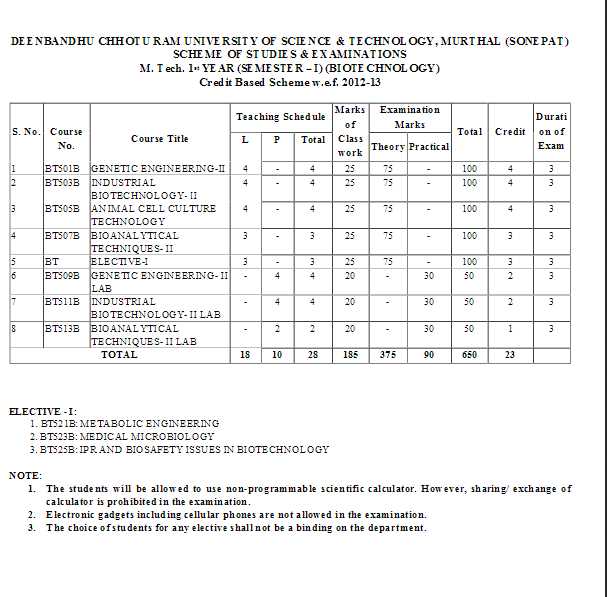|
#2
August 23rd, 2017, 11:28 AM
| |||
| |||
| Re: M.Tech in Murthal University
The Murthal University offers several Under Graduate and Post Graduate Programs in several disciplines. The University offers M.Tech Program also with several disciplines. As you want syllabus of M.Tech Biotechnology Program of Murthal University, so here I am providing syllabus: Murthal University M.Tech Biotechnology Syllabus SEMESTER I BT501B GENETIC ENGINEERING-II BT503B INDUSTRIALBIOTECHNOLOGY- II BT505B ANIMAL CELL CULTURETECHNOLOGY BT507B BIOANALYTICALTECHNIQUES- II BT ELECTIVE-I BT509B GENETIC ENGINEERING- IILAB BT511B INDUSTRIALBIOTECHNOLOGY- II LAB BT513B BIOANALYTICALTECHNIQUES- II LAB BT501B GENETIC ENGINEERING- II UNIT-I: Basic principles of Genetic Engineering: Introduction, gene cloning- basic steps; tools and vehicles ofgenetic cloning- restriction enzymes, modifying enzymes, ligases, polymerases, linkers and adaptors; cloningvectors (in brief): plasmids, bacteriophages, cosmids and phasmids, artificial chromosomes as vectors. Cloning, Recombinant Selection and Expression: Cloning strategy, construction of genomic and cDNAlibrary, integration of DNA insert into the vector, introduction of the rDNA into host cells; recombinantselection and screening methods: genetic, immunochemical, nucleic acid hybridization, HRT and HART;expression strategies: principles in maximizing gene expression, expression in bacteria, yeast and mammaliancells. UNIT-II: Gene Transfer to Animal and Plant Cells: Direct gene transfer methods, Agrobacterium mediated transfer, plant and animal viruses as vector systems, transgene expression, genetic manipulation of animals, animalcloning-a brief account. Gene Targeting and Gene Inactivation: Gene targeting in animals and plants, targeted gene replacement, gene inactivation, gene silencing, antisense RNA technology. UNIT-III: Molecular probes, PCR and hybridization techniques: DNA and RNA as probes, labeling (radioactive vs nonradioactive)and uses of probes, PCR: history and principle, modified PCR (inverse PCR, anchored PCR, PCRfor mutagenesis, RT-PCR, asymmetric PCR), cloning of PCR products, hybridization techniques (Southern, Northern, and Western). UNIT-IV: Applications of Genetic Engineering: Applications in research- in studying gene location, structure, expression and function, in studying regulation of gene expression; applications in producing industriallyimportant molecules, improving agronomic traits by genetic modifications; using genetic modifications tostudy, prevent and cure diseases, applications in forensic science- DNA profiling and DNA fingerprinting. TEXT/ REFERENCE BOOKS: 1. Primrose, S.B., and Twyman, R.M. Principles of Gene Manipulation and Genomics. 7th Edition, Blackwell Publishing(2001). 2. Old, R.W. and Primrose, S.B. Principles of Gene Manipulation- an introduction to genetic engineering. BlackwellPublishing. 3. Sambrook, J. and Russel, D.W. Molecular Cloning: A Laboratory Manual, Vols 1-3, CSHL. (2001). 4. Brown T.A. Genomes., 3rd ed. Garland Science. (2006). 5. Selected papers from scientific journals. BT505B ANIMAL CELL CULTURE TECHNOLGOY UNIT I: Lab Equipment and Media of Animal cell culture: Planning, construction and services, aseptic concepts, maintenance of sterility, cell culture vessels, common cell culture contaminants, cell culture media, serumfree media, maintenance of the culture and cell lines, detection of contamination and laboratorymanagement. UNIT-II: Different Types of Cell Cultures: History of animal cell culture, types of primary culture, chicken embryofibroblast culture, chicken liver and kidney culture, secondary culture, trypsinization, cell separation, continuous cell lines, suspension culture, monolayer culture etc., behavior of cells in culture conditions:division, growth pattern, metabolism of estimation of cell number, development of cell lines, characterization and maintenance of cell lines, cryopreservation of animal cell lines. UNIT-III: Characteristics of Animal Cells: Metabolism, regulation and nutritional requirements for mass cultivationof animal cell cultures, kinetics of cell growth and product formation and effect of shear force, product andsubstrate transport, micro & macro-carrier culture, hybridoma technology, Cloning in animals, geneticengineering in animal cell culture. UNIT-IV: Cell Culture Technology: integration of DNA into mammalian genome, viral vectors, shuttle vectors ofother viruses, gene cloning methods in cell lines, stem cell culture, embryonic stem cells and their applications. Tansgenics and Gene Therapy: Transgenics and gene knockout technology, objectives of gene transfer, vectors, gene constructs, promoters, transfection methods, embryonic stem cell transfer, targeted genetransfer, transgene integration, detection of transgenic and of trans gene function, transgenic animalsproduced, ethical issues related to transgenic animals, gene therapy.  |